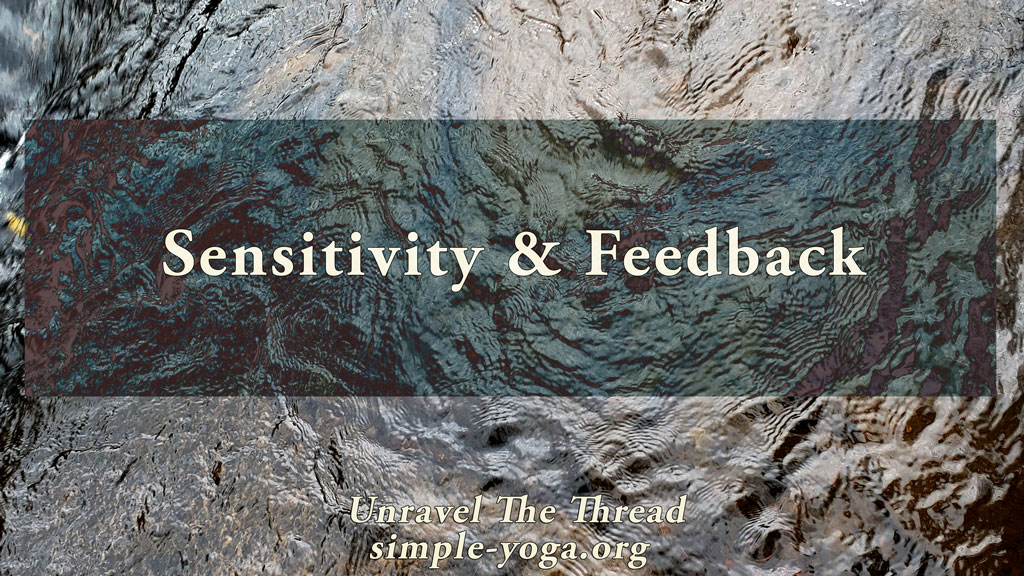
Distractions
April 20, 2024
A mantra for presence
June 30, 2024
Distractions
April 20, 2024
A mantra for presence
June 30, 2024Sensitivity and feedback

Sensitivity and feedback
When we think about yoga as an organic progression toward expanding our awareness, we realize that, more than a philosophy or a lifestyle, yoga is a lifelong journey of exploration and discovery. In this context, the idea of Range of Awareness offers us a variety of ways of directing our exploration. In other words, we expand our sensitivity and curiosity to experience the richness of life and all that it can teach us, not only about the experiences themselves, but also, and perhaps most important, about the nature of existence and our role in it, as Patañjali indicates in sutra 2.18 and in sutras 3.13 and 3.14
As we grow in awareness, we are more likely to recognize our tendencies, when they manifest, and how they manifest. This is a process in which we first become aware of the effects of our tendencies, often without connecting the effects to the action triggered by our tendency. For example, our tendency may be to underestimate how long it will take us to get from one place to another. Then, on the way to an appointment, we feel frustrated by the slowness of the traffic or the delivery truck blocking our way, causing us to drive aggressively or adopt a belligerent attitude. If we are late for our appointment, we may blame the traffic or other drivers for our tardiness, not considering that it may have been the result of our tendency to underestimate time leading us to not allow enough time to reach our destination.
Gradually, as we expand our awareness, we may notice the connection between the situations we find ourselves in and our personal tendencies. In our example, as we begin to feel irritation or frustration on the way to our meeting, it may become evident that some of our actions and choices have a direct impact on our tardiness. In other words, as we arrive late for another appointment, we may understand that our pattern of arriving late is not only influenced by the volume of traffic and the behavior of other drivers. Thus, our awareness creates an opening to understand that there are other options available to us, such as leaving with “extra” time, to ensure that we arrive on time, thereby showing respect for the other person’s time and their commitments. We can also realize that these other options can also help us avoid the stress and anger that comes from being in a hurry.
Becoming aware of the patterns in our experiences can eventually lead us to give ourselves enough time to get to our meetings without feeling stressed, frustrated, or annoyed by other people’s behavior. In this way, our awareness helps us to develop new, more useful tendencies. As a result, we may feel more empowered, knowing that we are making conscious decisions to arrive on time and not feel rushed. We may also find that the positive feedback of being on time reinforces the useful pattern, which eventually diminishes the unhelpful pattern. It becomes like an organic process where we do not have to invest too much time and energy as long as we are aware of and have patience with the part of ourselves that clings to some of these unhelpful tendencies.
This awareness of our personal tendencies empowers us to make intelligent choices that lead us to act consciously, without wasting time or energy in procrastination and frustration, and with the feeling that we are proactively participating in our lives, helping to create more harmony, and supporting life-affirming actions.
Our sensitivity is not fixed and it is not static, it varies along a spectrum. Let’s remember that our yoga practice is a process of exploring our own natural range of awareness and sensitivity. As with anything else, as we cultivate our sensitivity, our ability to perceive greater levels of subtlety increases. One of the typical results of our practice is to notice things that we did not notice before. For example, the more consistent our meditation practice becomes, the more noticeable it is when, after meditating and going about our day, we find ourselves quite impatient or irritated. Sometimes this leads us to ask, “Why am I meditating more and getting more frustrated?” We may even be tempted to think that we are meditating incorrectly or that our meditation is counterproductive. What happens to many of us is that by sharpening our attention during meditation, we find it easier to notice more things with greater clarity. It is possible that instead of becoming more frustrated or impatient, we are becoming more aware of how often we feel irritation and impatience during our day. Then noticing our irritability or impatience is not a sign that meditation is not working. On the contrary, we are getting better at being aware. In other words, our meditation is actually working, we are noticing more clearly and at a higher level of sensitivity! Sensitivity is registering the feedback that results from our actions and interactions. The discomfort we experience can be understood as tapas, feeling the heat or friction caused by some of our attitudes, behaviors and beliefs. Our sensitivity alerts us to potential options for adjusting our beliefs, attitudes and behaviors.
An example that comes to mind is that for some of us there are activities that we tend to indulge in, such as eating. When we eat something that we like, we may get a very subtle cue from our body suggesting a good place to stop. Although the message is subtle, it is quite clear that we are reaching our satiety point. However, almost immediately after noticing this message, some of us begin to notice an internal process of negotiation taking place in our minds. Something along the lines of “but there is this other dish that I love that I have not tried yet.” Or “Wait a minute, there’s still dessert!” A part of us sometimes tries to come up with clever reasons to override the satiety feedback we received. We might think, “Well, it’s been a hard week with a lot of work, I certainly deserve to treat myself!” Or “I’ve been so good this week, it’s OK for me to misbehave a little.” Or maybe it is something like, “Remember, there is another stomach for dessert.” We may find that our ability to make excuses is extensive. A beautiful thing to understand is that the message we receive is always in our best interest and never contradicts pure common sense. Nor does it forbid us to override it. We are free to make whatever choices we wish, and of course we will experience the effects of our choices.
When we pay attention to this process, we witness an internal conflict emerging as friction between common sense and our ways of being. This is the basis of our yoga practice. This is exactly how we learn to modulate our ways of being. It is a very logical process. If we pay attention, we notice the feedback that results from our actions. This feedback offers suggestions that we are free to follow or ignore. Eventually we may realize that ignoring the feedback usually creates irritation, frustration, and pain. Becoming aware of how this process plays out in our daily activities helps us to more easily notice our tendencies and their usefulness or unhelpfulness. Eventually, we may realize that every time we listen to our awareness and sensitivity, we are glad we did, and every time we ignore the feedback, we end up thinking, “I knew that was not a good idea.” How many times do we have to go through this process to understand that our sensitivity and awareness are more trustworthy than our tendencies?
If the distinction between common sense feedback and our preferences is not clear, we can always stop and feel. We may find that our minds are caught up in the blurry boundaries between what we think we need and what we want. If we think about how the economies of many countries are currently structured, it may not be difficult to understand that our societies, like individuals, develop tendencies. For example, economies based on consumption often tend to create confusion between what we need and what we want. Becoming aware of our societal tendencies can make it easier for us to notice when we are told that we “really need” something that we do not really need. We can also become aware of the marketing campaigns that tell us, “You deserve this…” “You want that…”
Are you noticing changes in your sensitivity? Do you play some of these internal games to override the common sense feedback you receive? Which do you trust more, the feedback sensitivity loop or your inner tendencies? What happens when you follow your sensitivity? What happens when you follow your tendencies? Do you recognize any of these tendencies in yourself? What are the tendencies you recognize in the society in which you live?
If you prefer, you may listen to the podcast:
This is an excerpt from the book Unravel the thread: Applying the ancient wisdom of yoga to live a happy life
If you find Simple-Yoga.org and Unravel the thread useful, consider supporting my labor with a donation, you may also donate using PayPal or Venmo. Thank you!
